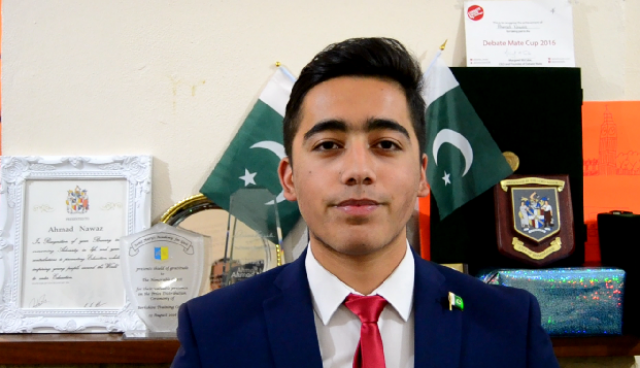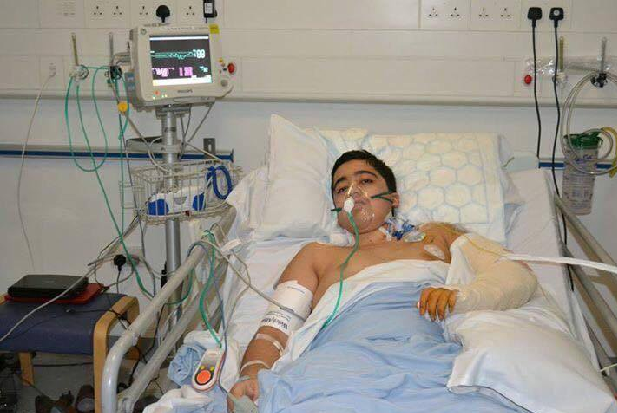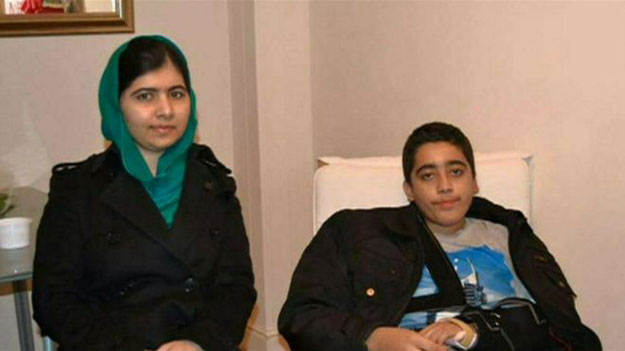APS strengthened survivor’s resolve to defeat terror
The Express Tribune speaks to 16-year-old Ahmad Nawaz

Ahmed Nawaz. PHOTO: EXPRESS
While around 150 people – mostly young students – were massacred by terrorists; Ahmad Nawaz, 16, was lucky enough to survive. The haunting images of violence, however, would give him flashbacks for the rest of his life.
“I can never forget the attack. The sight of my friends getting brutally killed will always haunt me,” recalls Nawaz, who had a brush with death on this day three years ago.
“My nerves and bones were incredibly damaged during the attack and the doctors in Pakistan suggested I should be shifted to the Queen Elizabeth Hospital in England,” he tells The Express Tribune.
He was moved to England where he has undergone multiple surgical procedures.
Three years on, painful memories still haunt families of APS martyrs
For Nawaz, the mental and emotional pain was far worse than the physical injuries he had sustained. He lost his younger brother Haris in the attack. “Missing my brother and friends keeps bringing back the pain. But we have to get over this and defeat this menace of terrorism,” he says. “I have countless memories with him. We lived a wonderful life together.”
He reminisces how the siblings had indulged in an argument on the morning of Dec 16 because Haris wanted to skip school.
“Haris didn’t want to go to school but I insisted that we must go or else our parents will get angry. This got us into a heated argument and that was the last memory I have of him,” he says.

Life after attack
After the attack, Nawaz says his world turned upside down and his perception on life changed. “I used to play with friends back then but now my aim is to spread education in Pakistan. I want to raise my voice for education in Pakistan."
About the government support post Peshawar attack, Nawaz says the authorities were initially helpful and even sent him abroad for his treatment, but not for too long. “They stopped paying for my treatment, as well as living expenses in the UK six months after the attack."
Nawaz finds the continuing terror attacks in the country "disappointing", calling upon the government to to take extra measures to protect and secure educational institutions throughout the country.
"The message the government ultimately gave is that educational institutions are not safe and children are at their own risk. Schools and universities are supposed to be safe and if children do not feel protected there then where will they go?"
"We have to fight terrorism through education and break the roots of their ideology. Only military operations isn’t the way out," he adds.
That traumatic day, however, has pushed Nawaz to work for making a change in the lives of those who have suffered like him at the hands of terrorists.
He is now moving past his trauma to create a difference. He speaks about his experiences on different forums and plans to move back to Pakistan after completing his education.
Endeavours on education
He started a campaign when he heard that a number of students from the UK were travelling to Iraq and Syria for terrorist activities. “I started giving speeches to children, helping them understand that terrorism has a massive effect on families like mine."
The initiative led to his meeting with British PM Theresa May, who commended his bravery and the campaign he is carrying out.
“One of my ambitions is to start a campaign in Pakistan to impart quality education in tribal areas, Balochistan and elsewhere by providing scholarships to the deserving children,” Ahmad shares his goals for Pakistan.
“My message to all Pakistanis is to educate your children... I’d humbly request the youth to invest in the country's development...you are the torch bearers of future.”
The young survivor met Nobel Laureate Malala Yousufzai, another champion of education in 2015, who appreciated his campaign and encouraged him to keep working.

Both Nawaz and Malala's educational campaigns, however, have some major differences. “Her campaign revolves around girls’ education and focuses on more than one country. I want to focus on education of both boys and girls in Pakistan,” Nawaz says.
Also serving as an ambassador to organisations such as World Merit, Comprehensive Disaster Response Services (CDRS) and Oxford Fund, Nawaz says he has been invited to address the United Nations, where he will highlight the sacrifices Pakistan has made and how citizens are striving to do better each day.



















COMMENTS
Comments are moderated and generally will be posted if they are on-topic and not abusive.
For more information, please see our Comments FAQ